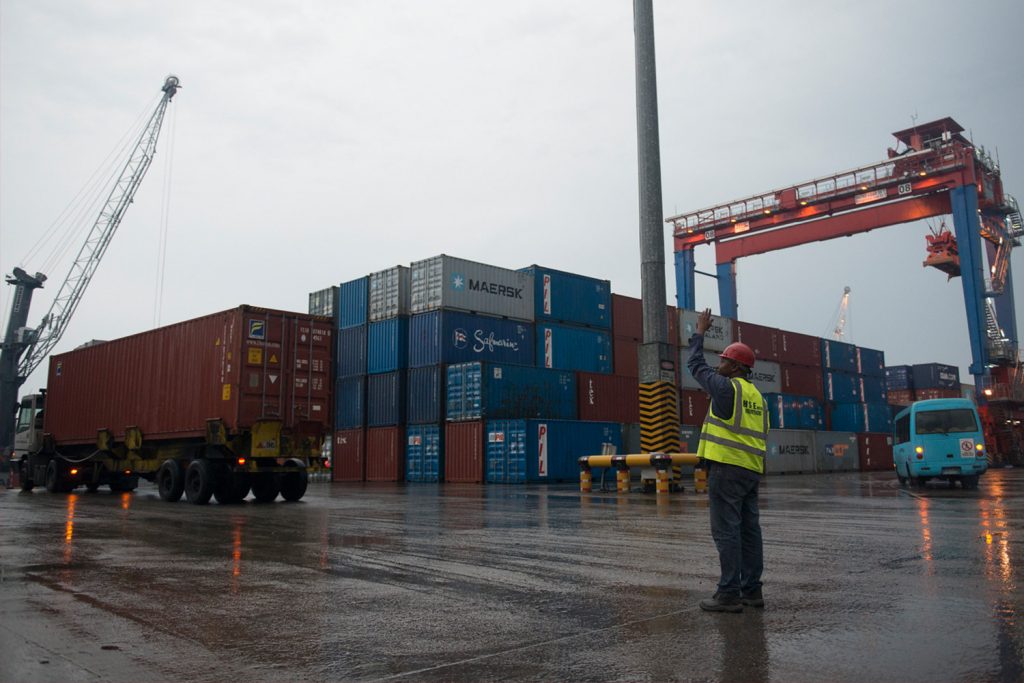APM Terminals Apapa, a prominent container terminal located in Lagos, Nigeria, has achieved a significant milestone in its operational history. In April 2025, the terminal handled a record-breaking 8,687 twenty-foot equivalent units (TEUs) of export cargoes, marking a substantial increase of over 30% compared to the 6,606 TEUs handled in April 2024. This achievement represents the highest monthly export volume ever recorded by the terminal since its inception in 2006, signifying a positive trend in Nigeria’s export sector and the terminal’s growing capacity to facilitate international trade. This surge in export volume not only underscores the terminal’s operational efficiency but also highlights the increasing competitiveness of Nigerian products in the global market.
Steen Knudsen, the Terminal Manager at APM Terminals Apapa, attributed this remarkable growth to several strategic improvements implemented at the terminal, including the launch of a new rail service in February 2025, which has significantly enhanced the movement of goods from inland areas to the Apapa port. This improved connectivity has streamlined the export process, reducing transit times and facilitating faster delivery of goods to international markets. Furthermore, the terminal has expanded its yard capacity specifically dedicated to export cargo, providing ample space for the storage and handling of outbound shipments. The introduction of dedicated truck lanes has further optimized the flow of export cargo within the terminal, minimizing congestion and ensuring timely vessel departures. These combined efforts demonstrate the terminal’s commitment to supporting Nigeria’s burgeoning export sector.
The significant increase in export volume handled by APM Terminals Apapa has positive implications for Nigeria’s trade balance. By facilitating the efficient export of goods, the terminal contributes to a more balanced trade dynamic, reducing reliance on imports and promoting economic growth. Knudsen emphasized the benefits of fully loaded departing vessels for Nigerian shippers, explaining that this practice optimizes shipping costs and makes Nigerian exports more competitive in the international market. When ships leave Nigerian ports fully loaded, it reduces the overall cost of shipping goods into the country, leading to cost savings for importers and ultimately benefiting consumers. This cost efficiency is crucial for fostering economic growth and enhancing Nigeria’s position in global trade.
The success of APM Terminals Apapa in boosting export volumes is aligned with the Nigerian government’s vision of transforming the country into an export-driven economy. The government’s focus on diversifying the economy away from oil dependence and promoting non-oil exports has created a favorable environment for businesses engaged in international trade. APM Terminals Apapa’s strategic investments and operational improvements demonstrate its commitment to supporting this national objective and contributing to the growth of Nigeria’s export sector. The terminal’s efforts are not only beneficial for its own business but also contribute to the broader economic development of the country.
Collaboration with key stakeholders has also been crucial to the terminal’s success. Knudsen acknowledged the vital support provided by the Nigerian Ports Authority (NPA), the Nigerian Railway Corporation (NRC), and other relevant agencies, emphasizing their role in enabling the terminal to provide high-quality services to its customers. The collaborative efforts of these agencies have helped to create a more efficient and streamlined operating environment, facilitating the smooth flow of goods through the port and contributing to the overall improvement of port operations. This collaborative approach is essential for fostering a thriving maritime sector and supporting economic growth.
APM Terminals Apapa’s performance reflects a consistent upward trend in export volumes handled over the past few years. In 2022, the terminal handled 53,807 TEUs of exports. This figure increased to 70,432 TEUs in 2023 and further rose to 77,631 TEUs in 2024, demonstrating a steady year-on-year growth. The record-breaking figure of 8,687 TEUs in April 2025 further solidifies this growth trajectory, indicating the terminal’s ongoing commitment to enhancing its capabilities and supporting the expansion of Nigeria’s export sector. This sustained growth signifies the terminal’s important role in facilitating trade and contributing to Nigeria’s economic development.














